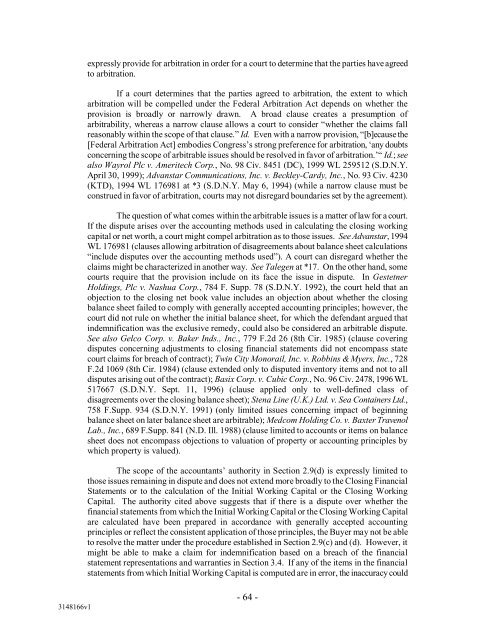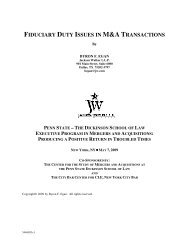asset acquisitions - Jackson Walker LLP
asset acquisitions - Jackson Walker LLP
asset acquisitions - Jackson Walker LLP
You also want an ePaper? Increase the reach of your titles
YUMPU automatically turns print PDFs into web optimized ePapers that Google loves.
expressly provide for arbitration in order for a court to determine that the parties have agreedto arbitration.If a court determines that the parties agreed to arbitration, the extent to whicharbitration will be compelled under the Federal Arbitration Act depends on whether theprovision is broadly or narrowly drawn. A broad clause creates a presumption ofarbitrability, whereas a narrow clause allows a court to consider “whether the claims fallreasonably within the scope of that clause.” Id. Even with a narrow provision, “[b]ecause the[Federal Arbitration Act] embodies Congress’s strong preference for arbitration, ‘any doubtsconcerning the scope of arbitrable issues should be resolved in favor of arbitration.’“ Id.; seealso Wayrol Plc v. Ameritech Corp., No. 98 Civ. 8451 (DC), 1999 WL 259512 (S.D.N.Y.April 30, 1999); Advanstar Communications, Inc. v. Beckley-Cardy, Inc., No. 93 Civ. 4230(KTD), 1994 WL 176981 at *3 (S.D.N.Y. May 6, 1994) (while a narrow clause must beconstrued in favor of arbitration, courts may not disregard boundaries set by the agreement).The question of what comes within the arbitrable issues is a matter of law for a court.If the dispute arises over the accounting methods used in calculating the closing workingcapital or net worth, a court might compel arbitration as to those issues. See Advanstar, 1994WL 176981 (clauses allowing arbitration of disagreements about balance sheet calculations“include disputes over the accounting methods used”). A court can disregard whether theclaims might be characterized in another way. See Talegen at *17. On the other hand, somecourts require that the provision include on its face the issue in dispute. In GestetnerHoldings, Plc v. Nashua Corp., 784 F. Supp. 78 (S.D.N.Y. 1992), the court held that anobjection to the closing net book value includes an objection about whether the closingbalance sheet failed to comply with generally accepted accounting principles; however, thecourt did not rule on whether the initial balance sheet, for which the defendant argued thatindemnification was the exclusive remedy, could also be considered an arbitrable dispute.See also Gelco Corp. v. Baker Inds., Inc., 779 F.2d 26 (8th Cir. 1985) (clause coveringdisputes concerning adjustments to closing financial statements did not encompass statecourt claims for breach of contract); Twin City Monorail, Inc. v. Robbins & Myers, Inc., 728F.2d 1069 (8th Cir. 1984) (clause extended only to disputed inventory items and not to alldisputes arising out of the contract); Basix Corp. v. Cubic Corp., No. 96 Civ. 2478, 1996 WL517667 (S.D.N.Y. Sept. 11, 1996) (clause applied only to well-defined class ofdisagreements over the closing balance sheet); Stena Line (U.K.) Ltd. v. Sea Containers Ltd.,758 F.Supp. 934 (S.D.N.Y. 1991) (only limited issues concerning impact of beginningbalance sheet on later balance sheet are arbitrable); Medcom Holding Co. v. Baxter TravenolLab., Inc., 689 F.Supp. 841 (N.D. Ill. 1988) (clause limited to accounts or items on balancesheet does not encompass objections to valuation of property or accounting principles bywhich property is valued).The scope of the accountants’ authority in Section 2.9(d) is expressly limited tothose issues remaining in dispute and does not extend more broadly to the Closing FinancialStatements or to the calculation of the Initial Working Capital or the Closing WorkingCapital. The authority cited above suggests that if there is a dispute over whether thefinancial statements from which the Initial Working Capital or the Closing Working Capitalare calculated have been prepared in accordance with generally accepted accountingprinciples or reflect the consistent application of those principles, the Buyer may not be ableto resolve the matter under the procedure established in Section 2.9(c) and (d). However, itmight be able to make a claim for indemnification based on a breach of the financialstatement representations and warranties in Section 3.4. If any of the items in the financialstatements from which Initial Working Capital is computed are in error, the inaccuracy could3148166v1- 64 -
















